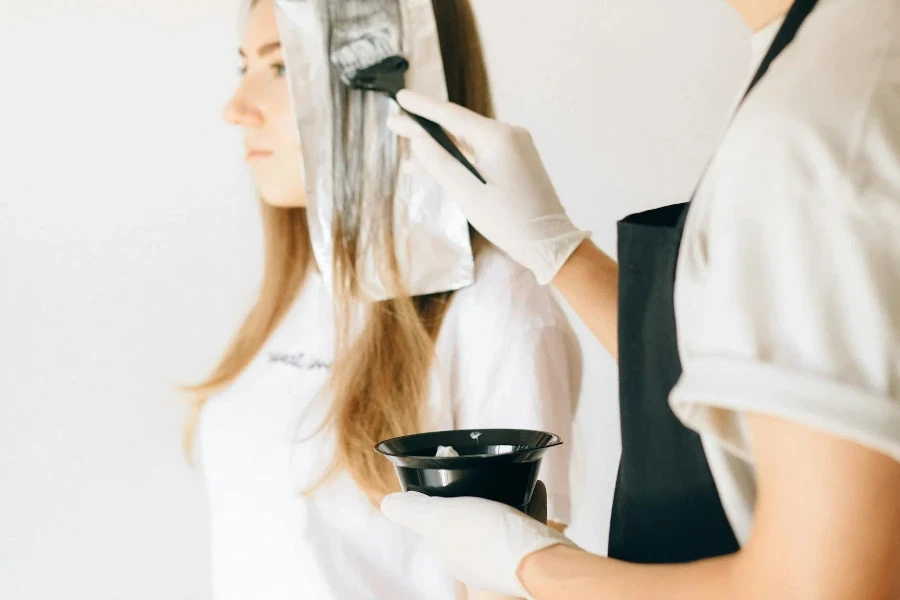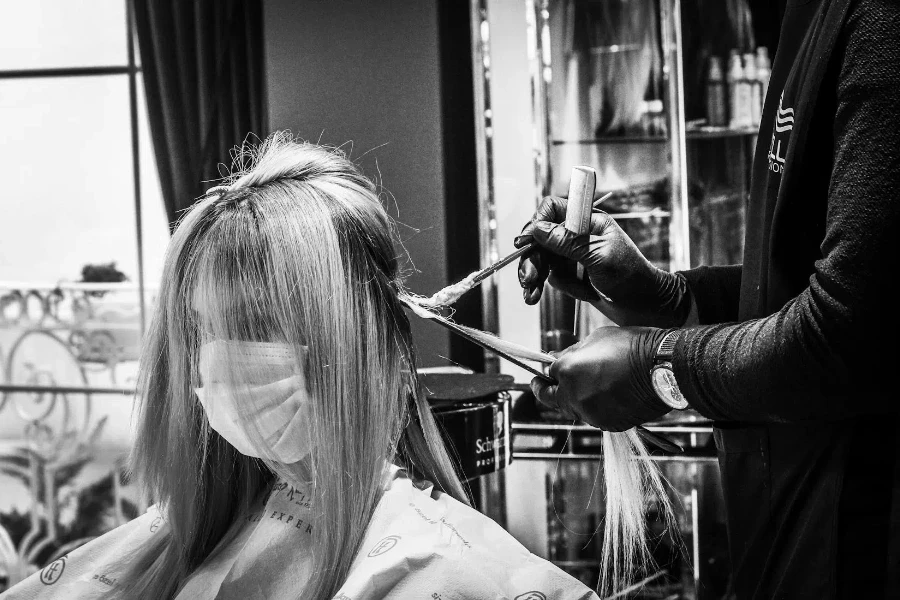In the ever-evolving landscape of beauty and personal care, dry scalp treatments have emerged as a crucial product category. As we step into 2025, the demand for effective solutions to combat dry scalp issues is on the rise, driven by increasing consumer awareness and the influence of social media trends. This guide delves into the essentials of sourcing dry scalp treatments, highlighting their market potential and growth opportunities.
Table of Contents:
– Understanding Dry Scalp Treatments and Their Market Potential
– Exploring Popular Types of Dry Scalp Treatments
– Addressing Common Consumer Pain Points with Effective Solutions
– Key Factors to Consider When Sourcing Dry Scalp Treatments
– Final Thoughts on Sourcing Dry Scalp Treatments
Understanding Dry Scalp Treatments and Their Market Potential

Defining Dry Scalp Treatments and Their Benefits
Dry scalp treatments are specialized products designed to alleviate the discomfort and flakiness associated with a dry scalp. These treatments often include ingredients like essential oils, moisturizing agents, and anti-inflammatory compounds that soothe irritation and restore the scalp’s natural moisture balance. The benefits of these treatments extend beyond mere hydration; they can improve overall scalp health, reduce dandruff, and enhance hair quality.
Analyzing Market Demand and Growth Trends
The global hair and scalp care market, which includes dry scalp treatments, was valued at USD 98.10 billion in 2023 and is projected to reach USD 154.79 billion by 2030, growing at a CAGR of 6.73%. This robust growth is fueled by a combination of factors, including the rising prevalence of scalp issues, increased consumer spending on personal care, and the introduction of innovative products by leading brands. Companies like Beiersdorf AG, Johnson & Johnson Services, Inc., and L’Oréal S.A. are at the forefront of this market, continuously developing new formulations to meet consumer needs.
Social Media Influence and Trending Hashtags
Social media platforms play a pivotal role in shaping consumer preferences and driving demand for dry scalp treatments. Hashtags such as #DryScalpRelief, #ScalpCare, and #HealthyScalp have gained significant traction, with influencers and dermatologists sharing tips and product recommendations. The visibility of these hashtags highlights the growing awareness and concern for scalp health among consumers. Additionally, the trend towards natural and organic ingredients is evident, with hashtags like #NaturalHairCare and #OrganicScalpTreatment reflecting the shift towards eco-friendly and sustainable products.
In conclusion, the market for dry scalp treatments is poised for substantial growth in 2025, driven by consumer demand for effective and innovative solutions. By understanding the benefits of these treatments, analyzing market trends, and leveraging social media influence, business buyers can make informed decisions when sourcing products in this dynamic and expanding market.
Exploring Popular Types of Dry Scalp Treatments

Natural Oils: Pros, Cons, and Consumer Feedback
Natural oils have long been heralded as effective treatments for dry scalp conditions. Oils such as coconut, jojoba, and argan are frequently used due to their moisturizing properties. Coconut oil, for instance, is rich in fatty acids that penetrate the hair shaft, providing deep hydration. Jojoba oil, which closely mimics the scalp’s natural sebum, is excellent for balancing oil production and soothing irritation. Argan oil, often referred to as “liquid gold,” is packed with antioxidants and vitamins that nourish the scalp and promote healthy hair growth.
However, while natural oils are beneficial, they are not without drawbacks. Some consumers report that oils can leave a greasy residue, making hair appear oily and unwashed. Additionally, the effectiveness of these oils can vary depending on the individual’s hair type and scalp condition. For instance, those with fine hair may find that oils weigh their hair down, while individuals with thicker hair may benefit more from the deep conditioning properties.
Consumer feedback on natural oils is generally positive, with many praising their ability to alleviate dryness and flakiness. According to a professional report, the demand for natural and organic hair care products has surged, reflecting a broader trend towards eco-friendly and sustainable beauty solutions. Brands like Briogeo and Moroccanoil have capitalized on this trend, offering a range of oil-based treatments that cater to various hair types and concerns.
Medicated Shampoos: Effectiveness and Key Ingredients
Medicated shampoos are another popular choice for treating dry scalp conditions. These shampoos often contain active ingredients such as salicylic acid, ketoconazole, and coal tar, which target specific scalp issues. Salicylic acid, for example, helps to exfoliate the scalp, removing dead skin cells and reducing flakiness. Ketoconazole is an antifungal agent that combats dandruff and seborrheic dermatitis, while coal tar slows down the production of skin cells, reducing scaling and itching.
The effectiveness of medicated shampoos largely depends on the active ingredients and the severity of the scalp condition. For instance, a study highlighted that shampoos containing ketoconazole are particularly effective in treating dandruff and seborrheic dermatitis. However, these shampoos can sometimes cause side effects such as dryness or irritation, especially if used too frequently.
Brands like Nizoral and Neutrogena T/Gel are well-regarded in this category, offering formulations that address a range of scalp issues. Consumer feedback indicates that while these shampoos are effective, they are often used in conjunction with other treatments to manage side effects and enhance overall scalp health.
Leave-In Treatments: Innovations and Market Reception
Leave-in treatments have gained popularity due to their convenience and effectiveness. These treatments are designed to be applied to the scalp and left in without rinsing, allowing the active ingredients to work throughout the day. Innovations in this category include products that combine multiple benefits, such as hydration, anti-inflammatory properties, and scalp protection.
One notable innovation is the use of biotech-derived ingredients. For example, K18’s Airwash Dry Shampoo contains Mediterranean microalgae, which balances scalp health and controls excess oil production. This multifunctional approach not only addresses dryness but also promotes overall scalp health.
Market reception for leave-in treatments has been positive, with consumers appreciating the ease of use and the prolonged benefits. Brands like Living Proof and Kérastase have introduced leave-in treatments that cater to various scalp concerns, from dryness to sensitivity. According to a professional report, the trend towards multifunctional hair care products is expected to continue, driven by consumer demand for convenient and effective solutions.
Addressing Common Consumer Pain Points with Effective Solutions

Identifying Major Consumer Concerns
Consumers dealing with dry scalp conditions often face several common issues, including itchiness, flakiness, and sensitivity. These symptoms can be both uncomfortable and embarrassing, leading individuals to seek effective and immediate solutions. Additionally, some consumers experience allergic reactions to certain ingredients, further complicating their search for suitable treatments.
Solutions for Itchy and Flaky Scalp
To address itchiness and flakiness, products that contain soothing and exfoliating ingredients are essential. Shampoos with salicylic acid or zinc pyrithione can help exfoliate the scalp and reduce flakiness. For instance, Head & Shoulders Clinical Strength Shampoo is formulated with selenium sulfide, which targets severe dandruff and provides relief from itching.
For those seeking natural solutions, products containing tea tree oil or aloe vera can be beneficial. Tea tree oil has antifungal and antibacterial properties that help reduce dandruff and soothe the scalp, while aloe vera provides hydration and reduces inflammation. Brands like Paul Mitchell and Jason Natural offer products that incorporate these ingredients, catering to consumers looking for natural alternatives.
Addressing Sensitivity and Allergic Reactions
Consumers with sensitive scalps or allergies need to be particularly cautious about the ingredients in their hair care products. Hypoallergenic and fragrance-free formulations are often recommended for these individuals. Products that contain gentle, soothing ingredients such as chamomile, oat extract, and calendula can help calm irritation and reduce the risk of allergic reactions.
Brands like Free & Clear and Vanicream specialize in products for sensitive skin and scalps, offering shampoos and conditioners that are free from common irritants such as sulfates, parabens, and fragrances. According to consumer feedback, these products are effective in managing sensitivity and providing relief from dryness and irritation.
Key Factors to Consider When Sourcing Dry Scalp Treatments

Evaluating Ingredient Quality and Safety Standards
When sourcing dry scalp treatments, it is crucial to evaluate the quality and safety of the ingredients used. Business buyers should prioritize products that contain high-quality, clinically proven ingredients. For instance, ingredients like salicylic acid, ketoconazole, and coal tar should be sourced from reputable suppliers to ensure their efficacy and safety.
Additionally, it is important to consider the regulatory standards in different markets. Products must comply with local regulations regarding ingredient safety and labeling. For example, the European Union has stringent regulations on cosmetic ingredients, and products sold in this market must meet these standards. Brands like La Roche-Posay and Eucerin are known for their adherence to high safety standards, making them reliable choices for business buyers.
Understanding Packaging and Sustainability Trends
Sustainability is a growing concern among consumers, and this trend is influencing the packaging choices of hair care products. Business buyers should look for products that use eco-friendly packaging materials, such as recycled plastics or biodegradable materials. Additionally, packaging should be designed to minimize waste and ensure product stability.
Brands like Aveda and Ethique are leading the way in sustainable packaging, offering products in recyclable or compostable packaging. According to a professional report, the demand for sustainable beauty products is expected to increase, making it essential for business buyers to consider the environmental impact of their sourcing decisions.
Assessing Supplier Reliability and Certification
The reliability of suppliers is a critical factor in sourcing dry scalp treatments. Business buyers should work with suppliers who have a proven track record of delivering high-quality products on time. It is also important to verify that suppliers have the necessary certifications, such as Good Manufacturing Practice (GMP) certification, which ensures that products are consistently produced and controlled according to quality standards.
Brands like Johnson & Johnson and Procter & Gamble have established relationships with reliable suppliers, ensuring the consistent quality of their products. Business buyers should also consider conducting regular audits and quality checks to maintain high standards and ensure compliance with regulatory requirements.
Final Thoughts on Sourcing Dry Scalp Treatments
In conclusion, sourcing effective dry scalp treatments requires careful consideration of ingredient quality, packaging sustainability, and supplier reliability. By prioritizing high-quality, clinically proven ingredients and adhering to local regulatory standards, business buyers can ensure they are offering safe and effective products. Additionally, understanding consumer trends towards natural and sustainable products can help buyers make informed decisions that align with market demands.




